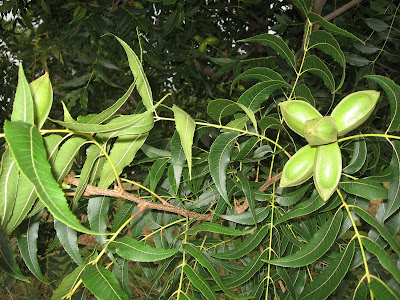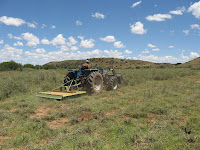Business Day 5th May 2008
http://www.businessday.co.za/articles/saexporter.aspx?ID=BD4A759924SA Exporter
Posted to the web on: 05 May 2008Nurturing an organic business with credibility
Penny Haw discovers a farmer nutty enough to produce and export organic pecans
AGRICULTURISTS will tell you that pecans are difficult to produce successfully in SA. The trees require particularly long summers with exceptionally high temperatures and extremely low temperatures during very short winters.
Most tellingly, pecan trees — which only begin yielding nuts in their eighth or ninth year — demand more water than is widely available in the country. Experts in agriculture will also tell you that organic farming is problematic, risky, expensive and time-consuming.
But Hopetown farmer Chris Roux has been contradicting these viewpoints for almost a decade and cannot produce enough of SA’s only European Union (EU) certified organic pecans, branded Roux Pecans, to meet the demands of his primary markets in Switzerland, Germany, the Netherlands and Norway.
He made the decision, in the late 1990s, that going the organic route was not only the responsible thing to do, but also that it made the most commercial sense. It was not, however, easy to convince others of his philosophy.
“Even now, farmers are not encouraged to farm organically in SA,” he says. “Fertilis er suppliers, machinery companies and other big cogs in the agricultural wheel want us to believe we cannot do without them and their hi -tech products. Banks have (antiquated) models that they absolutely have to abide by without the smallest departure, ever. These institutions cannot, or are not allowed, to imagine that a farmer who wants to do things differently can be successful.
“So it’s something you have to go out on a limb for if you believe in it.”
Roux was determined to make a success of organic crop growing and production. After studying at Glen College of Agriculture near Bloemfontein, Roux began to question contemporary agricultural methods. He wanted to farm as naturally as possible and recognised that his family’s farm, Ramah — located on the banks of the Orange River in the Northern Cape — was geographically and biologically ideal for pecans. Roux saw the potential of producing quality nuts with minimal intervention and so, in 1978, planted 5000 trees on 50ha.
In 1999 Roux’s uncontaminated, preservative-, pesticide- and residue-free pecans became the first EU certified Ecocert pecan nuts from Africa. In 2001 the farm met the even more stringent standards set by the Swiss authority, Bio Suisse. Today he produces in excess of 100 tons of pecan kernels each year and is preparing to plant another 2000 trees. The nuts are sold in ready-to-use vacuum packed units of 250g or 5kg blocks, in whole and half kernel options.
Ecocert certification means the farm qualifies to use the term “organic” to describe the entire process , from bud break in spring, through all agricultural procedures, harvesting and processing, to the delivery of the kernel in its marketing to all EU countries.
Bio Suisse certification means Roux Pecans meet Switzerland’s exacting organic standards that measure and monitor the natural diversity of the farm, and the absence of chemically synthesized pesticides, fertilisers, genetic engineering methods and unnecessary additives such as flavourings and colourings. Non- aggressive processing of foodstuffs is also essential to Bio Suisse certification.
Roux, who laments the fact the word “organic” is used with impunity in SA (with such fervour, in fact, that he has drastically limited his supply to local markets), believes that formal certification is essential to advance environmental and social responsibility.
“If you are in the business of marketing products that lean on a word like ‘organic’, credibility is challengeable,” he says. “Certification is about credibility. Reliable accreditation is regularly measured, consistent and should eliminate subjective discrimination. If you make claims about your products, then I believe it is essential a third party provides independent confirmation of these claims. We owe this to our markets and consumers. It’s the only way we can hope they will take organic farming and production seriously.”
Roux believes that the standards set by the EU via Ecocert certification have been painstakingly and expertly developed, and that they are comprehensive and relevant to SA producers.
“Why reinvent the wheel?” he asks. “SA should adopt the EU regulations. After all, the work has already been done. They have taken into account their entire area’s race, creed, language, cultural and economic differences — and it works. There’s no reason it should not work in this country. But instead, there is a drive in SA to lower the standards required to use the term ‘organic’ in marketing, allegedly to lower costs and make it easier for inexperienced farmers to attain certification.
“This is not only exploitation of consumers. It also misleads producers because credible organic farming is not more expensive than the alternative and second , it limits the likelihood producers will be able export their produce labelled ‘organic’. It just won’t be up to scratch.”














 Recently friends visited us on the farm and took a number of photos, two of which are here. The first is a view towards the house at Ramah with the Orange River in the distance, with the graceful and spectacular Oryx walking by in the foreground.
Recently friends visited us on the farm and took a number of photos, two of which are here. The first is a view towards the house at Ramah with the Orange River in the distance, with the graceful and spectacular Oryx walking by in the foreground.




 . Now the kernel begins to dry, and finally it falls to the ground after a week or two suspended in the "shuck"
. Now the kernel begins to dry, and finally it falls to the ground after a week or two suspended in the "shuck"



 The door is the same and so was the shape of the house. There was not much garden then !!
The door is the same and so was the shape of the house. There was not much garden then !!
